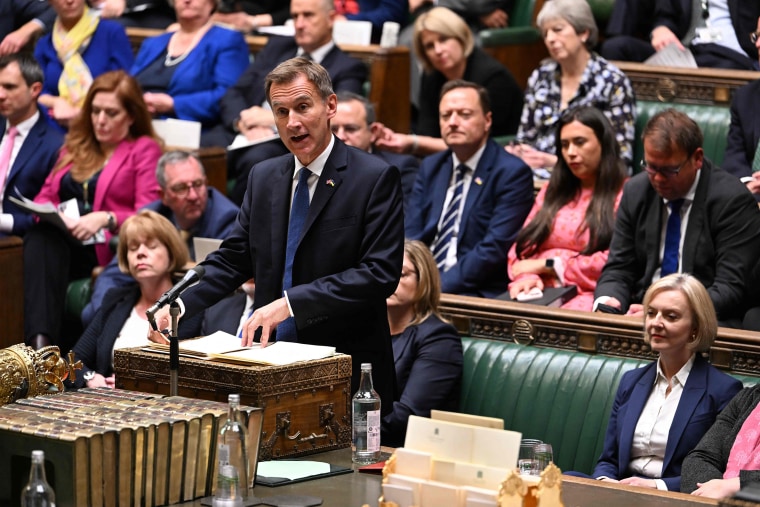LONDON — Liz Truss was not under a desk.
But the fact that a senior colleague had to confirm that to a raucous Parliament on Monday is a sign of just how badly things are going for Britain’s prime minister.
Mired in a political and economic crisis of her own making, Truss has faced global ridicule, historically low public approval ratings and even an unfavorable comparison to a decomposing lettuce.
Having survived just over 40 days into the job, the question is how many more she has left.
Asked to come to the House of Commons to answer an urgent question on her decision to ditch her finance minister in a desperate bid to save her premiership and calm markets rattled by their tax cut plan, Truss instead dispatched a government minister.
“For all we know right now … the prime minister is cowering under a desk and asking for it all to go away,” said Stella Creasy, a lawmaker with the opposition Labour Party.
“The prime minister is not under a desk,” Penny Mordaunt, the government minister, clarified.
Truss did later appear in Parliament, though only to sit silently beside her new finance minister, Jeremy Hunt, as he announced the reversal of almost her entire agenda.

The prime minister had not been seen or heard from in days, sparking accusations that she was no longer in control as a flood of media reports detailed plots within the ruling Conservative Party to oust her.
The Economist magazine gave a stinging verdict on her premiership, arguing that she only had seven full days in control before becoming hostage to market forces. “That is roughly the shelf-life of a lettuce,” it said.
The tabloid newspaper The Daily Star took this metaphor to its literal conclusion by setting up a YouTube livestream to see whether Truss would stay in her job long enough for an actual supermarket lettuce to rot while left unrefrigerated and adorned with a blond wig.
President Joe Biden even joined the criticism with a rare comment on an ally’s economic policies in which he called the tax cut plan a “mistake.”
Truss admitted fault Monday night. “I do want to accept responsibility and say sorry for the mistakes that have been made,” she told BBC News. Her radical plans to reshape the British economy went “too far, too fast,” she said, echoing the criticism of countless commentators and economists at home and abroad.
Hunt had earlier delivered a televised address to the nation, with a Union Jack flag in the background, announcing that he would stop 38 billion pounds ($42.9 billion) of tax cuts the government had proposed just weeks earlier.
His short-lived predecessor, Kwasi Kwarteng, was already cast aside. The only person to have served less time as chancellor of the exchequer, the finance minister’s official title since the 12th century, died of a heart attack.
But while the decision to unceremoniously abandon the plans — and the man who introduced them — seemed to have calmed global markets after weeks of turmoil, the damage has been done.
Hunt’s intervention amounted to a public execution of Truss’ high-growth, low-tax, free marketeer political philosophy, with the sheer scale of the reversal leaving commentators to conclude he was the country’s de facto leader.
Hunt is among those floated as a potential successor, as is Mordaunt and even Boris Johnson, who only months ago resigned after a wave of scandals.
“The only thing that keeps her in office, and it’s not a small thing, is the inability to agree on a successor or a transition process,” said Rob Ford, a professor of political science at the University of Manchester.
Experts point to a lack of experience and an unhealthy dose of dogmatic attachment to ultraconservative economic theory as a toxic combination behind Truss’ travails.
“Anyone could have seen that this wasn’t going to fly — how could they have not seen that coming?” Ford said. “This was a stark-staringly obviously incredible plan in the strict definition of that word: It lacked credibility from the moment it arrived.”
It arrived in a speech to the House of Commons last month, when Kwarteng delivered a “mini-budget” that within days would see the value of the pound crater and the cost of government borrowing balloon to unsustainable levels.
As critics had predicted, markets tanked and the pound fell to its lowest level against the dollar in 30 years.
The central Bank of England was forced to make a rare intervention to stop what it called a “fire sale” that threatened to trigger a financial crash.
While the plan has now been scrapped, the British public will pay the price with soaring mortgage rates and the prospect of broad cuts to cherished public services that were already strained.
And politically, the damage could be terminal. “It wasn’t just a total disaster with the markets, it was a total disaster electorally,” Ford said of Truss’ economic plan.
She is now left with the plan in smoldering ruins and her authority shot to pieces.
The Conservative Party trails the left-of-center Labour Party opposition by 36 points, according to one striking poll. Truss’ personal approval ratings are now at minus 70, according to another poll.
Before plunging her government and country into crisis, Truss began her tenure with a decisive intervention to help the public with spiraling energy prices ahead of winter.
“It takes a special kind of talent to spend tens of billions of pounds helping people with their bills and end up within minutes being cast as villains who are in the pockets of the rich,” Ford said. “It’s inverse Midas levels of genius.”
Even this policy was curtailed by Hunt.
Truss told the BBC on Monday night that she would lead the Conservative Party into the next election, though the media and many of her own colleagues seem to think it’s unlikely she’ll still be in office at Christmas.
First, she has to outlast the lettuce.
